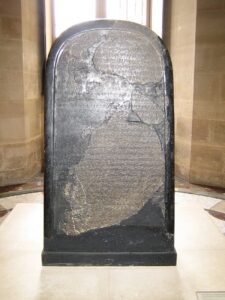Why King Mesha of Moab Sacrificed His Oldest Son, Baruch Margalit, Biblical Archaeology Review (12:6), Nov/Dec 1986.

Mesha Stele. By Henri Sivonen from Helsinki, Finland – Mesha Stele, CC BY 2.0, https://commons.wikimedia.org/w/index.php?curid=4761690
In his highly interesting article, “Why the Moabite Stone Was Blown to Pieces,” BAR 12-03, Professor Siegfried Horn recounts the ninth-century B.C. war between Moab and an alliance of Israel, Judah and Edom. When the alliance besieged the Moabite capital of Kir-Hareseth, the Moabite king Mesha, in desperation, sacrificed his eldest son to the god Chemosh. King Mesha offered the crown prince as a burnt offering on top of the city wall in full view of the enemy forces (2 Kings 3-26–27).
With this horrifying act, Mesha turned defeat into victory. The allied forces retreated and Moab retained its independence for the next two centuries.
What was the reason for this sudden volte-face of the allied forces? Professor Horn offers a number of speculations, but concludes with the admission that “no one has been able to give a satisfactory answer.”
Recent scholarship places Mesha’s act in a wider cultural context and may even suggest an explanation.
In 1978, a cuneiform tablet from the Syrian city of Ugarita was published,1 the text of which indicates that Mesha’s seemingly unprecedented, as well as morally outrageous, act was in fact carried out in accordance with ancient Canaanite laws of “holy war.”
Read the rest of Why King Mesha of Moab Sacrificed His Oldest Son in the online Biblical Archaeology Society Library.



